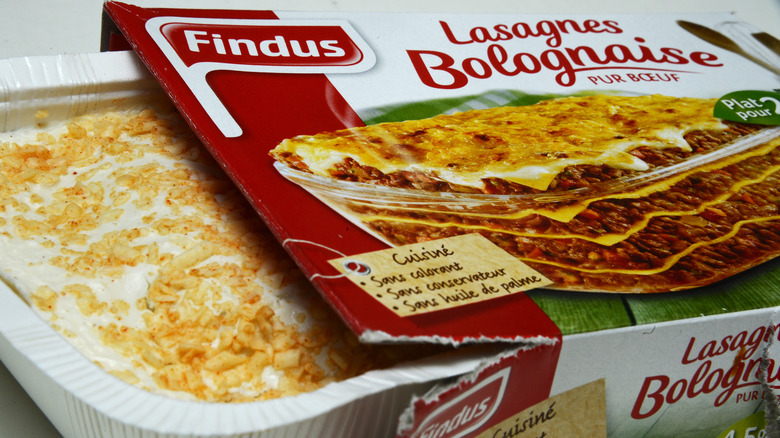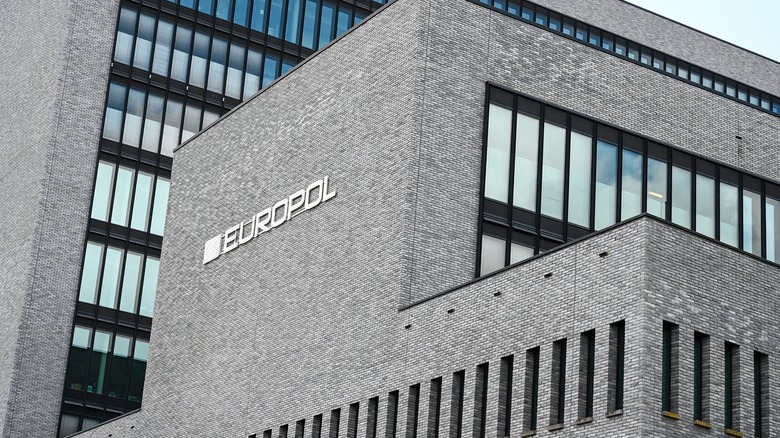The Aldi Frozen Pasta Horse Meat Controversy You Might Have Forgotten About
It's been a decade now, and a chaotic one at that, so you might have forgotten the sensational scandal that swept through European grocery stores back in 2013. Numerous frozen and ready-made meals that purported to be made with ground beef were found to contain large quantities of horse meat. The story ended up resurfacing in July, when Newsbreak reported that products at Aldi grocery stores were found to contain up to 100% horse meat. The article didn't clarify a timeline for these events, leading many social media users to believe the scandal was breaking at that moment. However, Reuters' fact checkers swiftly published a rebuke, explaining that there was no reason to believe Aldi products sold in 2023 were anything other than what the labels suggested.
All seems to be in order now. But in 2013, that story was very real (and very current). Samples of frozen beef lasagna and frozen spaghetti bolognese sold at Aldi locations in the UK were found to contain 30-100% horse meat. But that was just the beginning.
Over the course of that year, many of the UK's largest grocery chains, including Tesco, Lidl, Sainsbury's, and Asda, pulled products from their stores as "Horsegate" left thousands of shoppers in fear. When government agencies stepped in to investigate, they uncovered a twisted web of deceit that stretched across more than a dozen European nations. It became international news, changing our worldview on food safety. And its impact lives on today.
The horse meat scandal first surfaced in Ireland
This equine ball of chaos began rolling in November 2012, when the Food Safety Authority of Ireland (FSAI) tested meat products from a range of supermarket chains. They discovered that one-third of frozen hamburger samples contained horse meat. Authorities traced these products to ABP Food Group, a meat supplier with subsidiaries in Ireland and Great Britain. This brought the UK Food Standards Agency (FSA) into the picture, and in January 2013, the scandal went public.
Around 10 million frozen burgers were pulled from shelves at Aldi, Tesco, Lidl, and other supermarkets in the UK and Ireland. Burger King, which had also gotten beef from ABP, hurried to switch suppliers. All told, ABP lost around €45 million, but it turned out it wasn't the original source of the horse meat. Irish authorities ultimately came to believe that the contaminated meat had originated in Poland, although the exact source was never firmly established.
The frozen burger scandal led to mass testing of beef products in groceries across the UK, and that's when things went from bad to worse. It was February of 2013 when lasagna and bolognese meals sold by Aldi and Tesco through frozen food brand Findus were found to contain horse meat. But those products hadn't been sourced through ABP, and thus a second network of horse meat fraud was uncovered, apparently independent of the first. This time, the criminals were apprehended — and you won't believe the brazen nature of their crimes.
Four people were arrested for adulterating beef with horse meat
Aldi's contaminated pasta meals were made by French company Comigel, which supplied beef products to 16 countries. This prompted multinational authorities, including Europol, to investigate. They found that Comigel had subcontracted production of its frozen meals to a factory in Luxembourg, which had sourced its meat from another French company called Spanghero. The managers of Spanghero had purchased that meat from Draap, a company registered in Cyprus. (Confusing enough for you? That's the nature of supply chains.)
Draap was run by Johannes "Jan" Fasen, a Dutch businessman who had previously been convicted of fraudulently selling horse meat. (As if that weren't condemning enough, the name Draap spelled backwards is "paard," the Dutch word for horse.) Fasen was ultimately arrested in Spain in July 2019, more than six years after the scandal broke. He was sentenced to two years in prison and was permanently banned from working in the French meat industry. His associate, Hendricus Windmeijer, was also arrested, receiving a one-year suspended sentence.
Additionally, two managers of Spanghero, Jacques Poujol and Patrice Monguillon, were arrested by French authorities. Fasen insisted that they had knowingly purchased horse meat from him and that they were responsible for mislabeling it as beef. Poujol served six months of a two-year sentence, while Monguillon received a one-year suspended sentence. In the end, the biggest impact of Horsegate was the EU tightening its food safety regulations, thus far avoiding another scandal of that scale.


